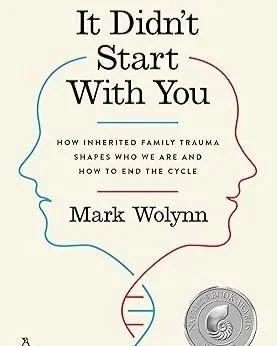Book Review: It Didn’t Start With You
Have you ever felt weighed down by emotions, fears, or patterns you could not explain? Or feel a lingering anxiety or sense of guilt that seems to have no clear origin? In It Didn’t Start With You: How Inherited Family Trauma Shapes Who We Are and How to End the Cycle, trauma specialist Mark Wolynn explores this exact phenomenon and offers both hope and practical tools for healing.
Wolynn’s book is built on the idea that trauma can be passed down through generations, not just through family stories or behaviors, but also through biology. Drawing on research in epigenetics, neuroscience, and psychology, he discusses how unresolved trauma in parents, grandparents, and even great-grandparents can show up in our emotional lives, relationships, and health.
The book blends scientific studies, case examples from Wolynn’s clinical practice, and guided exercises for readers to trace the origins of their own inherited trauma. It is not a light read, but it can be deeply affirming for anyone who has sensed that their struggles might be rooted in something older than themselves.
Key Takeaways
Family patterns often repeat silently: Many of us unconsciously reenact the emotional pain or coping mechanisms of past generations, even if we are not aware of their stories.
Trauma can leave biological marks: Research shows that severe trauma can alter gene expression, affecting future generations' stress responses and emotional regulation.
Inherited trauma is not destiny: Wolynn emphasizes that while we may inherit certain emotional patterns, we also have the power to interrupt these cycles through awareness, acknowledgment, and intentional healing practices.
The Core Language Approach: A standout tool in the book is Wolynn’s “Core Language” method which helps identify emotionally charged words, fears, or phrases you repeat in your inner dialogue. These verbal clues can uncover hidden family trauma stories that may be driving current issues.
Wolynn writes with empathy and insight, making complex scientific ideas accessible without watering them down. The personal stories from his clients offer relatable, moving examples of how inherited trauma manifests in modern life. This book can feel heavy at times, particularly for readers actively working through their own trauma. Some of the exercises require a willingness to dig into painful family history or emotional wounds. It is important to remember that while this is a valuable self-help tool, it is not a substitute for therapy, and Wolynn frequently recommends professional support for deeper work.
Gabbi Niemi, MSW, LCSW
Reference
Wolynn, M. (2017). It didn't start with you: How inherited family trauma shapes who we are and how to end the cycle. Penguin Books.

